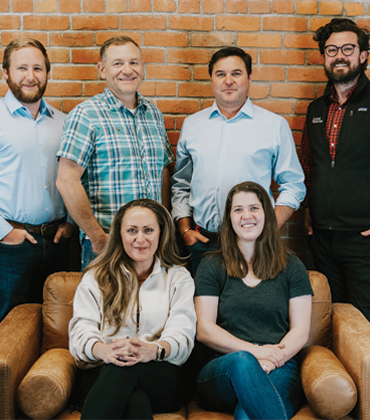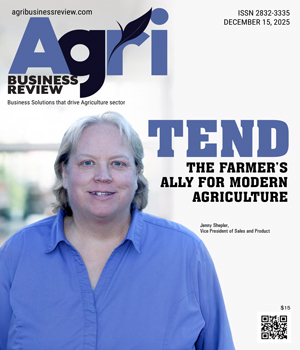Clear Frontier Ag Management, founded in 2019 and based in Omaha, NE, is a specialist farmland investment manager that focuses on fostering and enabling the transition to USDA Certified Organic in the U.S. row crop sector.
Founder and CEO Justin Bruch, who transitioned their family farm in 2015, saw the benefits of the switch to organic production and decided that creating a structure to tackle the barriers to transition would allow more farmers to follow the same path.
He states, “The key barriers are access to knowledge related to the transition process and capital that is aligned to the three-year transition period. Therefore, Clear Frontier seeks to enable farmers to transition to Certified Organic with Clear Frontier as the landlord partner, giving longer-term leases with a payment structure that better aligns with the farmer’s cash flow through the transition period.”
Clear Frontier closed its first 10-year fund in 2023 and has over 25k acres under management across many of the core irrigated row crop regions.
Charles Newton, partner at Clear Frontier, comments, “Our funds aim to generate the dual benefit of greater financial returns to investors in conjunction with better sustainability and impact outcomes compared to typical conventional farmland funds.”
The organic price premium primarily drives the greater returns. The U.S. is a net importer of organic corn and soybeans and sees robust demand. Given the barriers to entry for new supply, these organic crops trade a significant premium to conventional corn and soybeans. This translates to higher farmer profitability and, in turn, farmland rents. Clear Frontier seeks to assist in developing the “organic ecosystem” through facilitating knowledge sharing, off-take market development, technology testing and access to capital.
Clear Frontier also partners with many emerging technologies to enable improved data capture and analysis to understand better the impacts, particularly concerning Soil Health and Carbon interactions.
Adele Durfey, director of sustainability, comments, “There have been significant improvements in the accuracy and cost of measurement, but there is still significant room for alignment between technologies, and this should, in turn, drive higher participation in the emerging soil carbon markets.”
After initial hype and many false starts, there is a growing consensus that soil health, farm profitability and climate resilience are intrinsically linked, and there is a significant opportunity to address all three.
Farmers in the U.S. are facing significant challenges with low commodity prices, high input costs, and high interest rates. Undertaking the transition to Organic takes a substantial long-term commitment. Many cases will require a whole farm to transition, given the specialist nature of farm machinery and management processes, and given that the USDA Organic standards do not allow the use of typical fertilizers and chemicals. Partners like Clear Frontier can significantly improve the chances for success in the transition, increasing the resilience of our rural communities and improving human and planetary health.
Founder and CEO Justin Bruch, who transitioned their family farm in 2015, saw the benefits of the switch to organic production and decided that creating a structure to tackle the barriers to transition would allow more farmers to follow the same path.
He states, “The key barriers are access to knowledge related to the transition process and capital that is aligned to the three-year transition period. Therefore, Clear Frontier seeks to enable farmers to transition to Certified Organic with Clear Frontier as the landlord partner, giving longer-term leases with a payment structure that better aligns with the farmer’s cash flow through the transition period.”
Clear Frontier closed its first 10-year fund in 2023 and has over 25k acres under management across many of the core irrigated row crop regions.
Charles Newton, partner at Clear Frontier, comments, “Our funds aim to generate the dual benefit of greater financial returns to investors in conjunction with better sustainability and impact outcomes compared to typical conventional farmland funds.”
The organic price premium primarily drives the greater returns. The U.S. is a net importer of organic corn and soybeans and sees robust demand. Given the barriers to entry for new supply, these organic crops trade a significant premium to conventional corn and soybeans. This translates to higher farmer profitability and, in turn, farmland rents. Clear Frontier seeks to assist in developing the “organic ecosystem” through facilitating knowledge sharing, off-take market development, technology testing and access to capital.
-
Clear Frontier seeks to enable farmers to transition to Certified Organic with Clear Frontier as the landlord partner, giving longer-term leases with a payment structure that better aligns with the farmer’s cash flow through the transition period.
Clear Frontier also partners with many emerging technologies to enable improved data capture and analysis to understand better the impacts, particularly concerning Soil Health and Carbon interactions.
Adele Durfey, director of sustainability, comments, “There have been significant improvements in the accuracy and cost of measurement, but there is still significant room for alignment between technologies, and this should, in turn, drive higher participation in the emerging soil carbon markets.”
After initial hype and many false starts, there is a growing consensus that soil health, farm profitability and climate resilience are intrinsically linked, and there is a significant opportunity to address all three.
Farmers in the U.S. are facing significant challenges with low commodity prices, high input costs, and high interest rates. Undertaking the transition to Organic takes a substantial long-term commitment. Many cases will require a whole farm to transition, given the specialist nature of farm machinery and management processes, and given that the USDA Organic standards do not allow the use of typical fertilizers and chemicals. Partners like Clear Frontier can significantly improve the chances for success in the transition, increasing the resilience of our rural communities and improving human and planetary health.
Company : Clear Frontier Ag Management
Headquarters :
. ManagementKaleb Kindler, Finance Controller, Justin Bruch, Founder & CEO, Charles Newton, Partner, Frank Ausin, Investment Director, Adele Durfey, Sustainability Director, Melanie Aust, Analyst
Thank you for Subscribing to Agri Business Review Weekly Brief



